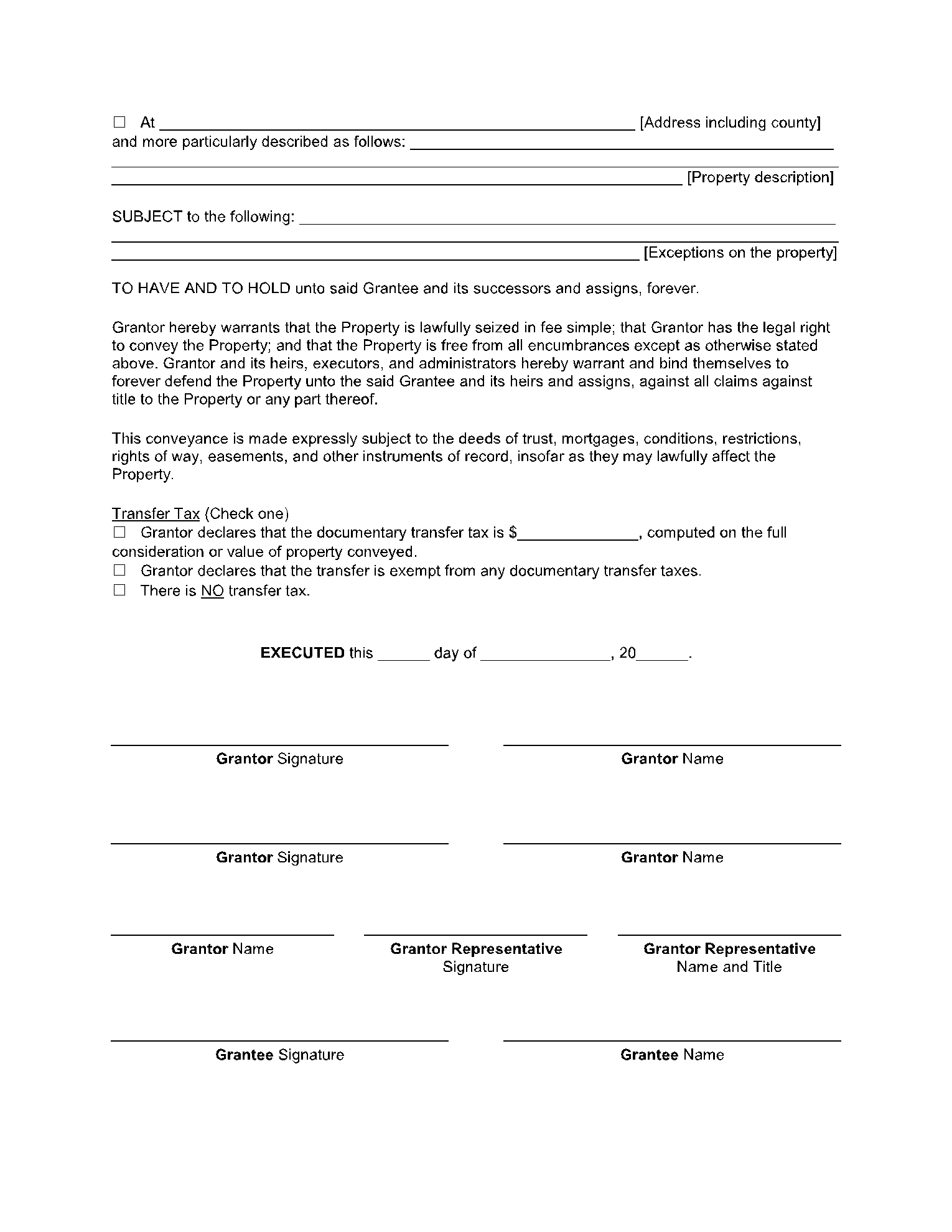General warranty deed forms are the most convenient type of deed, especially from the buyer’s point of view. The warranty deed is issued for real estate transactions when the seller can provide the title. It’s the document that offers the highest level of safety for the buyer, who can rest assured they are buying from a valid owner.
The warranty in the form refers to the entire history of the property and includes all past owners. It is written proof that the grantee is getting a piece of real estate with a clean title.
What Are the Types of Warranty Deeds?
There are two types of warranty deed forms, the general warranty deed, and the special warranty deed. They both offer some level of warranty to the buyer, but the difference is in the period to which the warranty refers. The general warranty deed covers the whole history of the property and all the previous owners.
When signing a general warranty deed, the grantee gets the guarantee that the title of the property exists and that every past transaction concerning the ownership of that particular property was done correctly. They know the title has no defect and that they are buying from the right and complete owner.
The special warranty deed, on the other hand, states that the grantor only offers a warranty for the period when the piece of real estate was in their physical possession. They offer no guarantees when it comes to issues connected to previous owners. So, while it is definitely better than a quitclaim deed, the special warranty deed provides less security than the general one.
When and Why Is a General Warranty Deed Needed?
Any type of real estate transaction can be made with a general warranty deed, as it offers the highest level of warranty to the buyer. But it’s particularly useful when the two parties are complete strangers, and there is no level of trust between them.
The last thing you would want to do is buy a piece of real estate from a stranger and later discover they weren’t actually entitled to sell. General warranty deed forms are needed for real estate transactions between strangers in any US state. The general warranty deed not only offers all the guarantees the grantor needs, but it’s also necessary for registration purposes.
It’s the document that mentions all the relevant details of the transactions and all the crucial identifying information. Once signed, the grantee must use the general warranty deed at the County Clerk’s Office for registration.
Who Needs a General Warranty Deed?
There are two parties involved in any deed, the grantor, or the seller, and the grantee, or the buyer. With general warranty deed forms, it’s the grantee that needs and most benefits from the document. It offers the type of warranty anyone would need when buying real estate property from someone they don’t know.
The general warranty deed isn’t only used between complete strangers. It’s a good option any time you don’t fully trust the person you want to buy from, even if it’s an acquaintance or a relative, or if they are honest but cannot provide the title. This is what the general warranty deed guarantees:
- That the piece of real estate hasn’t already been sold to someone else
- That the grantor is a valid owner and has the right to sell it
- In the case of multiple owners, the deed specifies the exact portion of the interest that is transferred to the grantee
- The seller guarantees that they will handle any possible claim that may appear in the future concerning the ownership and that they will reimburse the grantee, if necessary
- The warranty deed form clearly mentions that any debts connected to the property will be paid by the seller, not the buyer
- The grantee has the certainty that the actual property matches the legal description
What Information Is Included in the General Warranty Deed Form?
These are the elements all general warranty deed forms must include:
- The name and address of the preparer
- The name and address of the person who will receive the deed once it’s registered
- The State and County where the property is located and the deed is issued
- The price, or consideration
- The identifying information of the grantor and the grantee: full name and address of residence
- The legal description of the property
- Names and signature of all parties involved, including witnesses
- The notary public handles the last part of the deed and affixes their state seal
Conclusion
A warranty deed is a document you need to use when you are buying a piece of real estate property from someone you don’t know or trust because it offers the necessary guarantees. If possible, use the general warranty deed, as the guarantees it provides are unlimited.
Since it’s such an important document, it’s crucial to include all the relevant information. So, the best way to write it is with an efficient template, like the one we provide at CocoSign. All the templates we offer are easy to use and extremely helpful.
Florida Quit Claim Deed FAQs
-
What is the ‘title’?
The title of property mentions who the real owner is and gives them the right to sell it.
-
What are encumbrances in the warranty deed?
Encumbrances are interests in a title or a property. The most common examples are mortgages, unpaid taxes, liens, or pending legal challenges. You can transfer the title even if they exist, but the grantee must be aware of them, and the grantor remains responsible for clearing them.
-
What is the consideration in warranty deed forms?
The consideration is the price, the dollar amount that the grantee must pay in exchange for the real estate property.
-
Where can I get the legal description of the property, for the warranty deed?
To get the legal description, you need to go to the County Recorder’s Office.
-
Can I give my property to someone as a gift using a general warranty deed?
Yes, the general warranty deed can be used in this situation. But even if it’s a gift, you still need to write a symbolic amount on the document, usually $10.00. The consideration is a mandatory field for registration.



